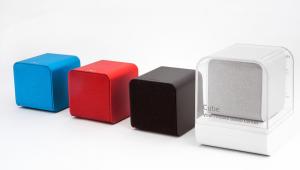How to Turn an Old iPod into Someone's Miracle

This week, I’m going to take a little break from obsessing/drooling over the latest tech in order to discuss something serious with you, and tell you what you can do to help. (It’s as easy as checking your electronics junk drawer, I promise!) I hope you’ll stay with me, but if do-goodery isn’t your thing, stop back next week, and I’m sure to have something new and electrical that makes fun noises.
Still here? Awesome. So, I probably don’t have to tell you too much about Alzheimer’s disease. The reason I don’t think I have to tell you is because it’s so prevalent. In the US alone, more than 5 million are living with it, and 1 in 3 seniors die with some form of it or dementia. Chances are good then, that you know someone living with or who has passed on and was affected by Alzheimer’s. I know I do. And as anyone who has watched the essence of their loved one slip further and further away each day can tell you: it sucks. It sucks, and it’s frightening, and it takes a huge toll on everyone involved, emotionally as well as financially. There’s no cure, and the treatments are limited in their abilities to assist. There’s a lot of research happening, but science is still a ways off from truly understanding what’s going on when a person develops Alzheimer's disease.
But recently, there’s been a really fascinating discovery. You see, our brains process and store music in a very diverse way. Listening to music stimulates not only our auditory sensors in the temporal lobe, but also the frontal lobe. The words in music stimulate Broca’s area and Wernicke’s area; both of which assist in speech. If we move or dance to music, the motor cortex is involved, as is the visual cortex. And perhaps most importantly to this discussion, the medial prefrontal cortex is stimulated, which is where we store memories associated with the song: a wedding, your family vacation as a kid, your first dance. In other words, listening to familiar music stimulates a variety of locations in the brain, some of which can access long term memory. It’s this long term memory that is devastatingly damaged from the onset of Alzheimers. Here’s the fascinating part: for some reason, when patients with Alzheimer’s hear familiar music, they are suddenly able to access long term memory that has long been lost to them due to the disease.
This is remarkable to witness. If you haven’t already seen the documentary “Alive Inside,” take a minute to watch this clip of Henry, a man struggling with Alzheimer’s who is completely transformed when he listens to music he once loved. Powerful stuff.
What does this have to do with technology (and you)? Well, non-profit group Music & Memory are trying to connect these patients who have need of music with their very own customized library on their very own iPod. Music & Memory are looking for donations of iPods, iPhones, Shuffles (they are using the Apple format for now) etc. that they will wipe clean of your data and then install the favorite music of a specific person who needs it. All you have to do is fill out the form, drop the device in a padded envelope, and send it off to them. They’ll even let you know that your donation reached its destination safely. After the most recent iOS developments at the Apple WWDC, I suspect a good number of you are going to be in the market for a new device soon. And let’s face it, you’re not going to be able to get all that much for it if you trade it in. So why not donate it instead? Or purchase a shuffle for $49 and send it. Or, if you’re feeling really ambitious, fund raise. Regardless of how you choose to help, know that a pebble’s worth of donation will make an immense ripple of betterment in someone’s life. Give the gift of music to a person with Alzheimers, and in a way, you’re also returning their entire lives. Not bad for just cleaning out your junk drawer.
- Log in or register to post comments






























































